Jasper Wu judge holds 2 of 3 suspects on murder charge
The judge said the third man acted in self-defense when he fired back at the shooter whose stray rifle round killed Jasper Wu.

Two young men must stand trial for the murder of toddler Jasper Wu on I-880 in Oakland in 2021, an Alameda County Superior Court judge has ruled.
Jasper was just 23 months old when he was killed by a stray bullet that crossed the freeway and entered his family's car as they drove south on Nov. 6, 2021.
Thirteen months later, in December 2022, authorities charged 22-year-old Trevor Green, 24-year-old Ivory Bivens and 28-year-old Johnny Jackson Jr. with Jasper's murder, along with a raft of other felonies related to their alleged "gun battle" on the freeway and the alleged gang rivalry that prompted it.
On the day of the shooting, the prosecution says, Green and Bivens drove to East Oakland in a Nissan Infiniti G35 and scoped out a rival gang member's home known as "the Deuce." It was a Saturday afternoon.
From the Deuce, the prosecution argued, Bivens followed Jackson and Keison Lee onto the freeway where Green used an assault rifle to open fire on their Nissan Altima.
One of those rounds, the prosecution says, traveled west across the freeway over multiple lanes of traffic and struck Jasper Wu in the head as he slept in his car seat.

Defense attorneys for Green and Bivens have maintained that the California Highway Patrol, the lead agency on the case, arrested the "wrong guys" and erroneously discounted statements from two drivers who said the westbound shots seemed to have come from a black SUV, not the sedan linked to their clients.
The SUV testimony was "certainly in conflict with the people's theory of this case," said Judge Scott Patton shortly before issuing his ruling Wednesday. "But that is not a conflict that I need to resolve for the purpose of a holding order."
Judge: A "planned ambush" — not a gun battle
In a preliminary hearing, often called a prelim or "px," the standard of proof is much lower than at trial: The px judge must determine only (1) whether a crime may have occurred and (2) whether the accused may have done it.
As a result of the lower standard of proof, attorneys don't present all their evidence. They generally put on just enough to meet the standard of probable cause. At trial, the prosecution must prove the case beyond a reasonable doubt.
The DA's office largely built its case for the Jasper Wu px around several key pieces of circumstantial evidence: Green's sister's DNA on an assault rifle shell casing that was found on the freeway, gunshot residue in Bivens' Infiniti, phone records, and undercover surveillance footage and wiretap recordings.
The Berkeley Scanner was the only news outlet in attendance for nearly all of the proceedings, which began April 24 and unfolded slowly over more than five weeks.
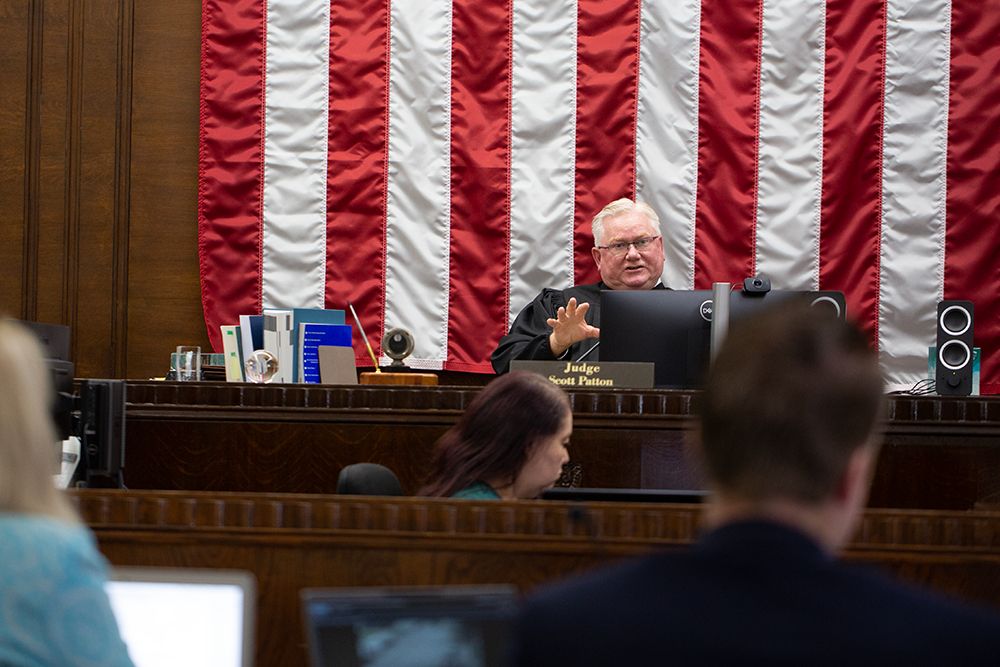
After several hours of closing arguments that ended late Wednesday afternoon, Judge Patton roundly rejected the prosecution's theory of a "roving gun battle" on I-880 and said the shooting had actually been a "planned ambush" of Jackson and Lee inside the Altima.
Jackson, by his own admissions — which were captured on recorded phone calls and played in court — returned fire from the passenger seat. But there is no evidence that he hit anyone.
Lee, who was behind the wheel, was struck in the back by a rifle round but still managed to drive to the hospital.
Lee survived the 2021 shooting but was killed in an unrelated shooting last year before charges in the Jasper Wu case were filed.
Green, Bivens could face life in prison, no parole
At the end of the prelim, Judge Patton held Green and Bivens to answer on all of the charges filed against them in December under former Alameda County DA Nancy O'Malley.
Those charges include the murder of Jasper Wu and the attempted murders of Lee and Jackson, as well as one count of criminal street gang conspiracy, all of which carry a number of special allegations and enhancements.
The murder charge in particular has special circumstances alleging drive-by murder and murder committed for gang purposes — either of which could result in life in prison without parole.
Some people expect Alameda County District Attorney Pamela Price to drop the "specials" in the coming weeks, in line with a strong stance she has taken against lengthy prison sentences.
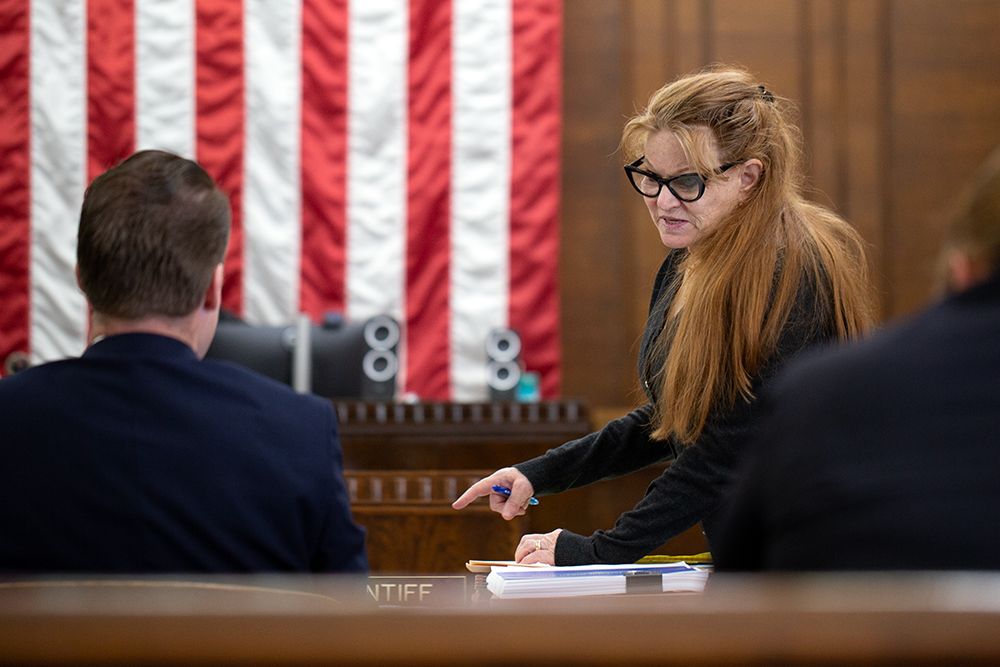
"The standard of proof at a preliminary hearing is very, very low. And the evidence is not as solid as the district attorney would have you believe," said Laurie Mont, who represents Trevor Green, after Wednesday's hearing. "This is an incredibly tragic case. It’s heartbreaking. But I think there was a rush to judgment and they have the wrong guys."
Defendants Green and Jackson each elected to have two attorneys for the case because it technically could be prosecuted as a death penalty matter.
Mont was joined by Linda Fullerton in representing Green, while Annie Beles and Charles Woodson represented Jackson.
Ernie Castillo went it alone on behalf of Ivory Bivens.
In practice, no one has been executed in California in nearly two decades, NPR reported in January, and Gov. Gavin Newsom adopted a moratorium on the death penalty in 2019.
"Johnny did nothing to cause the death of this child"
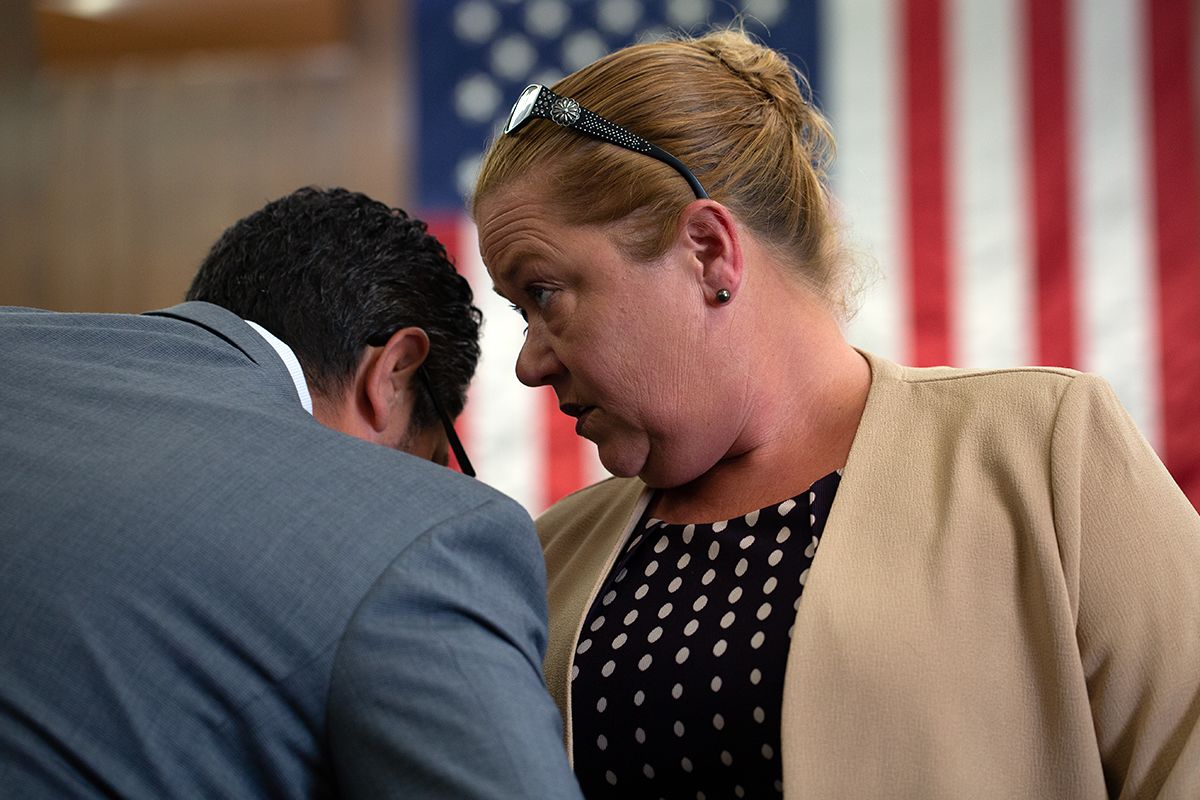
In her closing arguments, Beles said she had been asking the DA's office for months to look at her client's case. She'd been advised "to have patience for the review process," she said.
"Well, five months later, Mr. Jackson is still sitting in jail," she said.
"Self-defense law is clear," Beles continued. "Objectively, it is reasonable to shoot at someone who is shooting at you."
Unlike the case against Green and Bivens, Judge Patton said there had not been "a shred of evidence" presented over about a dozen days of testimony to substantiate anything beyond self-defense on Jackson's part.
Patton went on to say that, although Jackson fired a gun, this had been "either no factor … or a trivial factor" in Jasper's death.
Patton said that neither gang membership nor illegal gun ownership precludes the right to self-defense.
"One could argue," the judge said, "that the only thing that stops a bad guy with a gun is a good guy with a gun."
Patton said the prosecution had not proven the most serious charges against Jackson, including the murder of Jasper Wu and the attempted murders of Green and Bivens.
He did hold Jackson to answer on one count of being a felon in possession of a firearm, which carries a gang enhancement that could add 10 years to a prison sentence if found true.
The outcome was a huge victory for Jackson and an unusual turn of events: Homicide charges are rarely dropped at the prelim stage of the judicial process.
"We are very pleased with the judge's decision," Beles said after Wednesday's hearing. "As we said at the beginning, Johnny did nothing to cause the death of this child and the judge accurately applied the law."
Court focused on facts needed for probable cause
In high contrast to the heartbreaking and practically unimaginable nature of Jasper's death, the preliminary hearing itself was a largely technical affair.
Jasper's family, who has moved out of state, did not attend the hearing, although their lawyer was present for much of the testimony.
Several family members of the defendants as well as the grandfather of Keison Lee also diligently attended the hearing and listened carefully.
The court took pains, often at the urging of defense counsel, to limit the emotional impact of the case: No photos of the happy little boy with his family were projected on the screen. There was no police body-camera footage showing what the first officers to arrive saw inside the family car.
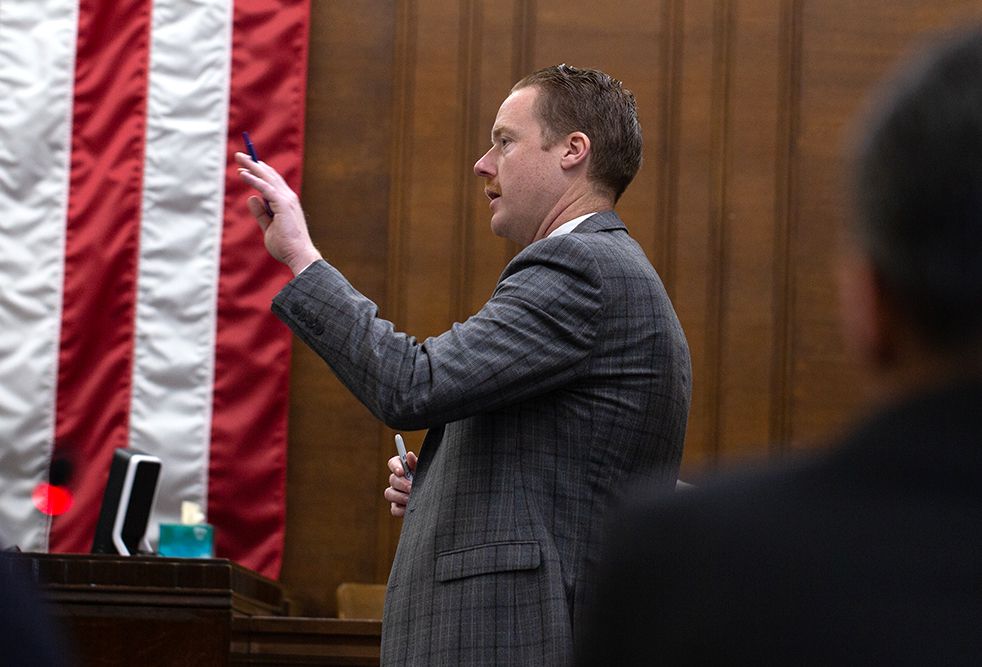
Prosecutor Peter McGuiness attempted to play that footage shortly after his first witness took the stand, but defense counsel strenuously objected.
Castillo said the footage would be "extremely prejudicial" and was "designed to tug at this court’s sympathies."
Mont said the footage served only to show "the anguish of the victim’s family" and would be "highly prejudicial."
And Beles said the footage would be "highly inflammatory."
Judge Patton ultimately agreed and said he would watch the footage privately in chambers rather than show it in open court.
In fact, throughout the proceedings, Jasper's name was only spoken by mistake.
The toddler is identified in charging papers as "John Doe," and the court agreed to refer to him that way throughout the preliminary hearing.
Toward the conclusion of the hearing, the court also agreed to remove "any pictures of the decedent" from the materials submitted as evidence in the prelim.
Judge rebuffs transfer DNA argument
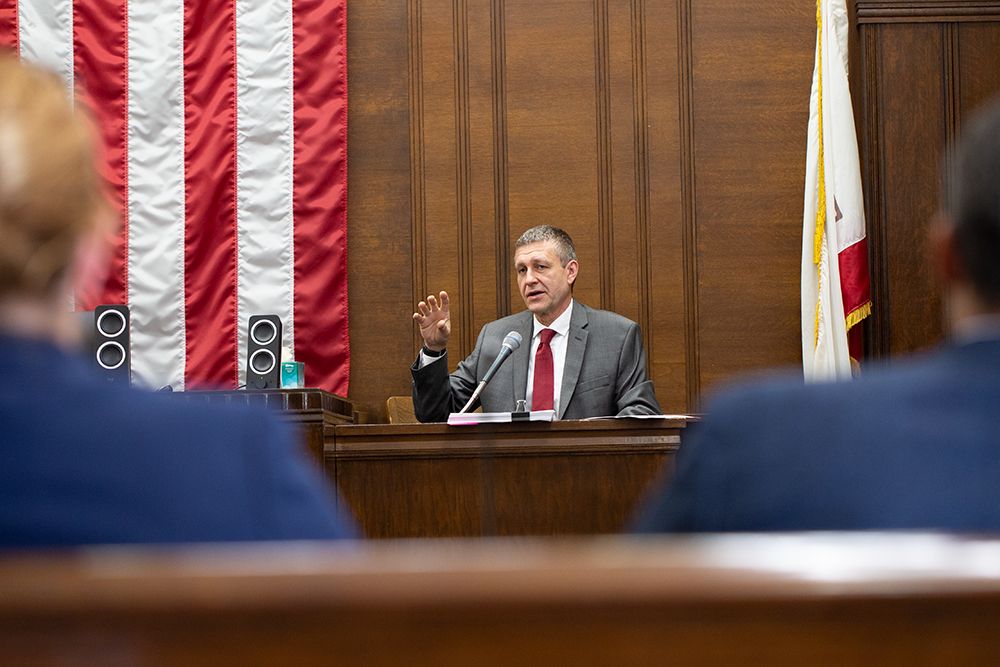
About two dozen witnesses ultimately testified over the course of the protracted hearing. That's also highly unusual.
More than half were involved in some way with the freeway investigation through law enforcement work or forensic analysis.
Officers described finding eight shell casings on northbound I-880 in the aftermath of the shooting.
The casings had the same headstamp markings and were the same caliber — PPU 19 7.62x39 — as 27 loose, unspent rounds found at a home in Richmond associated with Trevor Green and his sister, Destiny Green, according to the prosecution.
A forensic biologist for the Bureau of Alcohol, Tobacco, Firearms and Explosives explained how she identified Destiny Green's DNA on one of the fired casings from the freeway.
That sample had the highest value possible for a DNA match, the forensic biologist said: It was 1 trillion times more likely to be Destiny Green's DNA than anyone else's.
During cross-examination, Trevor Green's attorney, Mont, drilled into how the CHP had collected evidence on the freeway and asked about the possibility of transfer DNA, perhaps from debris used to mark evidence for pickup.
"Similar ammunition was found in the house she lives in," Judge Patton said, pushing back. "To say 'just as likely' it was transfer DNA from a cup on the highway seems like quite a flight of fancy."
"Focus on more reasonable positions," he added, urging Mont to move on.
Attorneys spar over importance of Infiniti
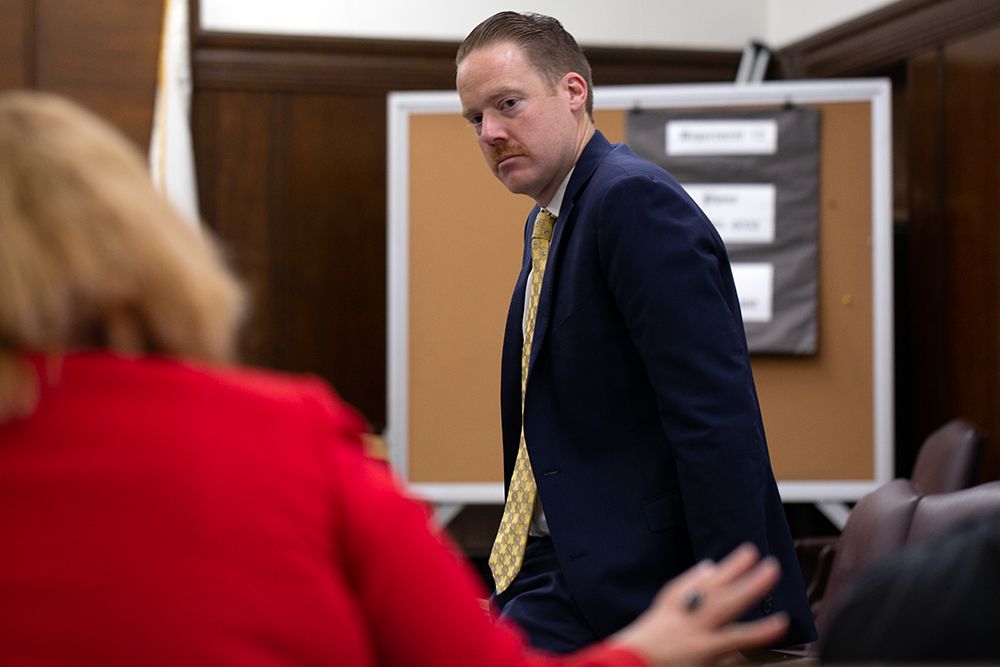
Throughout the hearing, Keison Lee was a strong presence in the courtroom despite having died last year: Attorneys on both sides used Lee's voice to bolster aspects of the case, playing his recorded phone calls for the court as well as CHP body-camera footage from when he was interviewed in the hospital right after being shot Nov. 6, 2021.
In one of his calls, Lee told a friend, Christopher Cullen, how an Infiniti had "pushed up" on him and Jackson just after they left the Deuce — Cullen's place — minutes before the shooting.
Lee told Cullen the Infiniti had "rolled past" the Deuce just before they left.
McGuiness played pole-camera footage from outside the Deuce to establish that Bivens' Infiniti had done just that. The camera had been part of an undercover operation into alleged gang Eddy Rock.
Bivens owned an Infiniti at the time of the shooting, according to the prosecution.
Defense counsel questioned whether the Infiniti in the footage in fact belonged to Bivens: Neither its occupants nor its license plate was captured in the pole-cam footage, although it did have black rims, consistent with Bivens' car, according to prosecution evidence.
Defense attorneys indicated that Infinitis were common in the neighborhood and that Bivens' Infiniti had been a platinum metallic color rather than black.
According to a recorded phone call, Cullen's Ring doorbell camera had also captured an Infiniti with black rims passing by shortly before the shooting — but lead detective Derek Hatzenbuhler, of CHP Golden Gate, said he had failed to secure that footage before it was purged from Ring's servers.
Mont, Green's attorney, stressed that the call between Lee and Cullen had happened before the shooting and did not actually place the Infiniti on the freeway.
She called evidence of the Infiniti "ephemeral at best."
Lee and Jackson, added Castillo, never described the shooter's car as an Infiniti in any of their recorded phone calls.
Wiretap call: "They got the whip"
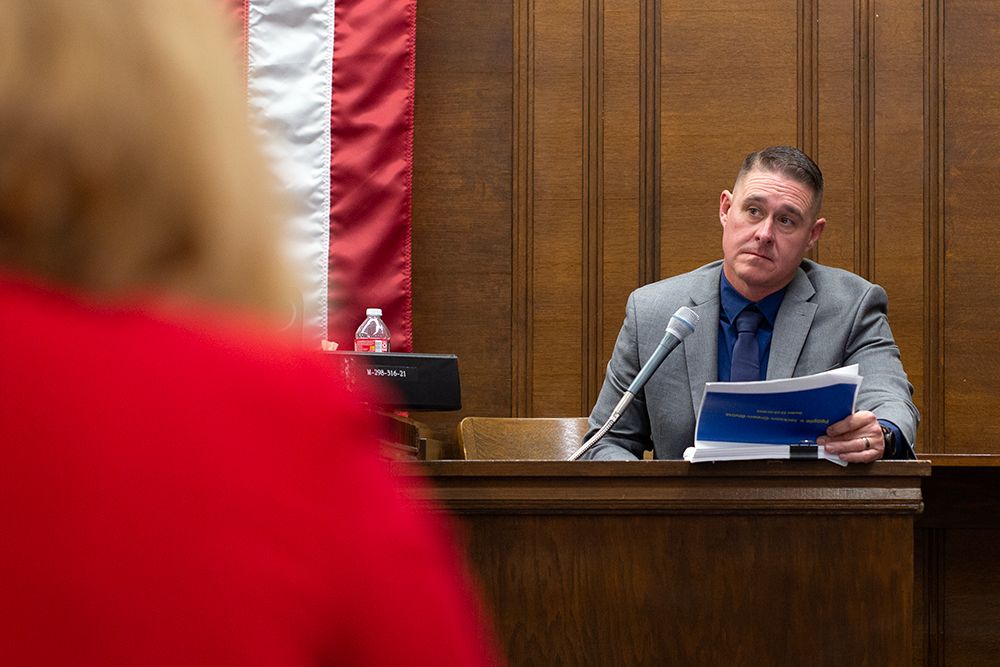
Hatzenbuhler, who spent more than two days on the stand, described how Cullen had sighed and looked away when he was shown a photograph of Bivens' Infiniti in August 2022.
"It was a gesture that indicated to me that he recognized the vehicle," the investigator said.
Hatzenbuhler had gone to see Cullen that day after getting approval to launch a wiretap investigation he hoped would help break the case.
After Hatzenbuhler left, Cullen immediately called Lee on what was then a recorded line, saying, "They got them" and "They got the whip," in reference to the Infiniti.
But Hatzenbuhler also acknowledged, on cross-examination by Castillo, that Cullen had no personal knowledge of what happened on the freeway. He'd still been at the Deuce when the violence broke out.
"He wasn’t on the freeway. He doesn't know anything about what happened on that freeway," Castillo said during closing arguments. "Yet police relied on that information to shape the investigation."
Lee had insisted from his hospital bed that he had not seen who shot him.
He told the detective he was driving to the burial site of someone close to him who had been killed two years before when bullets shattered his back window.
"I just drove," Lee told Hatzenbuhler at San Francisco General Hospital, according to the officer's body-camera footage, played in court. "When shots is goin' off, you just trying to see where they coming from and how you can get up outta there."
In a call recorded much later, he referenced rumors that linked Bivens and Green to the shooting, referring to them by their nicknames, Weez and T2.
"Abnormally white" hands with an assault rifle
Two drivers on I-880 North who were alone in their cars when they heard gunfire also testified in recent weeks.
Neither driver had a complete view of the shooting or any idea of what happened to Jasper on the southbound side.
But they indicated that someone in a black SUV had fired west toward a sedan on its left that was at times driving on the shoulder near the median.
"We cannot now look at a good Samaritan who witnessed a shooting of this magnitude and decide that it means nothing in a case like this," Castillo argued. "Their perception of what they saw on the freeway means everything in this case."
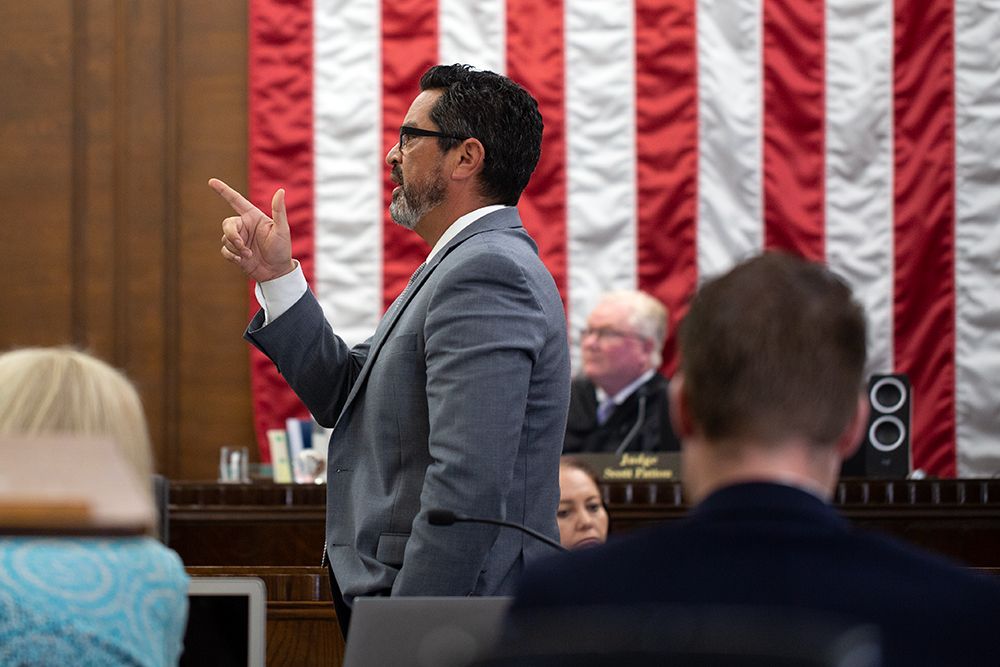
One of the drivers said he was close enough to the black SUV, in the lane just left of it, to see two white hands holding a large assault rifle out through the open rear passenger window as the SUV sped past him.
"I didn’t see any gunfire," he said. "I just saw a white hand holding it."
The man said he did not believe the shooter had been wearing white gloves, but also said the event had been "a blur," unfolding at highway speeds as he repeatedly ducked down out of fear of being shot himself — or being seen by the person with the rifle.
He said he could feel bullets flying over his head as the vehicles passed him on both sides, with the SUV seemingly in pursuit of the sedan. The bullets had been so loud and so close, he said he was surprised that none had struck his car.
The attorneys spent a fair amount of time asking the witness about the whiteness of the shooter's hands, and for good reason: All three defendants in the case are Black.
Prosecutor McGuiness asked the driver about how he had described the hands as "abnormally" white, as well as whether he could see beyond the shooter's wrists.
The driver said the shooter had been wearing a black long-sleeved jacket, so the arms weren't exposed. He said he hadn't seen any part of the shooter aside from the hands.
McGuiness also alleged, through law enforcement witnesses, that Trevor Green had worn gloves during a shooting in San Francisco in rival gang territory and that gloves and masks have become common gear during the commission of serious crimes.
Alleged Chopper City-Eddy Rock rivalry central to case
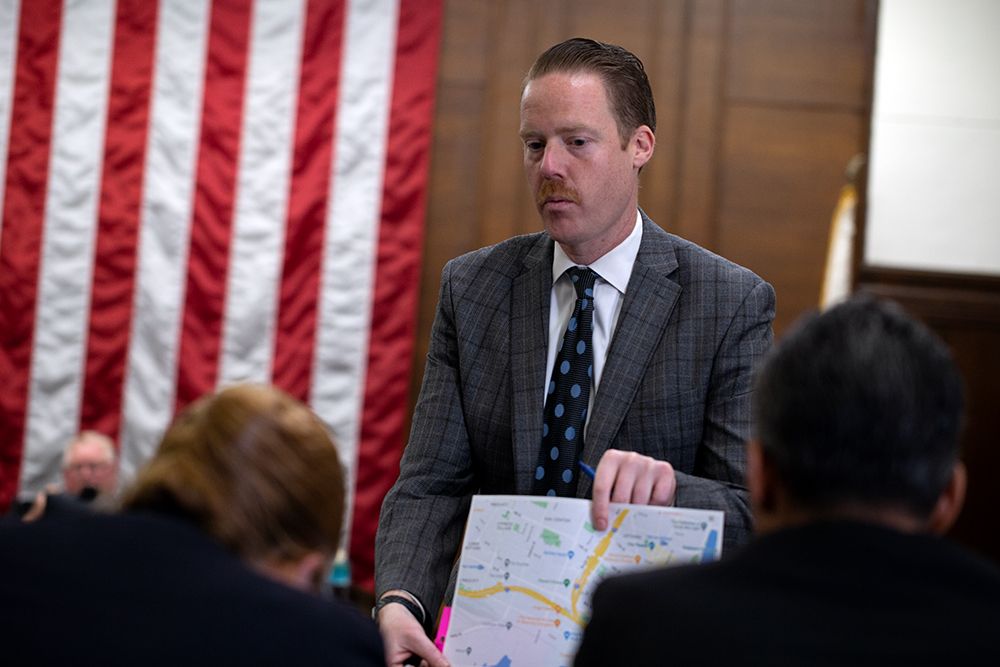
Much of the hearing focused on events and expert testimony related to the gang charges in the case, which can add serious time to prison sentences if they are proven.
Officers testified about an array of Bay Area crimes, from murder cases and non-fatal shootings to a violent robbery and a grand theft case, designed to lay the groundwork to establish Chopper City and Eddy Rock as longtime criminal street gangs based in San Francisco's Western Addition neighborhood.
They presented social media evidence they said illustrated a gang rivalry and signs and symbols specific to each group.
And, during the service of a search warrant at the Richmond home linked to the Greens, officers discovered a large memorial honoring people who were known to authorities as fallen gang members — including the one whose death had sparked the original conflict between Chopper City and Eddy Rock, according to witness testimony.
San Francisco Police Sgt. Damon Jackson testified over three days as an expert witness on SF street gangs, offering his opinion on an array of evidence and hypothetical scenarios presented by counsel on both sides.
The prosecution has alleged that Trevor Green and Ivory Bivens are part of Chopper City, while Keison Lee and Johnny Jackson Jr. were members of Eddy Rock.
Sgt. Jackson affirmed that position on the stand.
He also testified, while describing gang expectations around violence and retaliation, that Paris Moffett Jr., a 23-year-old man who was paralyzed in a shooting last year and then fatally shot in his Oakland care home in March, had been an Eddy Rock member.
Defense attorneys on the case spent a significant amount of time in recent weeks raising questions about new state legislation designed to make it harder to classify people as gang members.
"They don’t want to keep criminalizing the neighborhoods caught in cycles of poverty and violence for generations," said Linda Fullerton, Green's attorney.
All five of the attorneys disputed that their clients were part of gangs or that the groups were gangs at all.
They focused their arguments on the legal requirement to establish proof of some kind of organization within the group.
"There is no structure. There are no rules, except for 'thou shall not snitch,' and that is communitywide," Fullerton said of Chopper City. "It’s a group of friends who have grown up together with absolutely no structure. Some of them commit crimes."
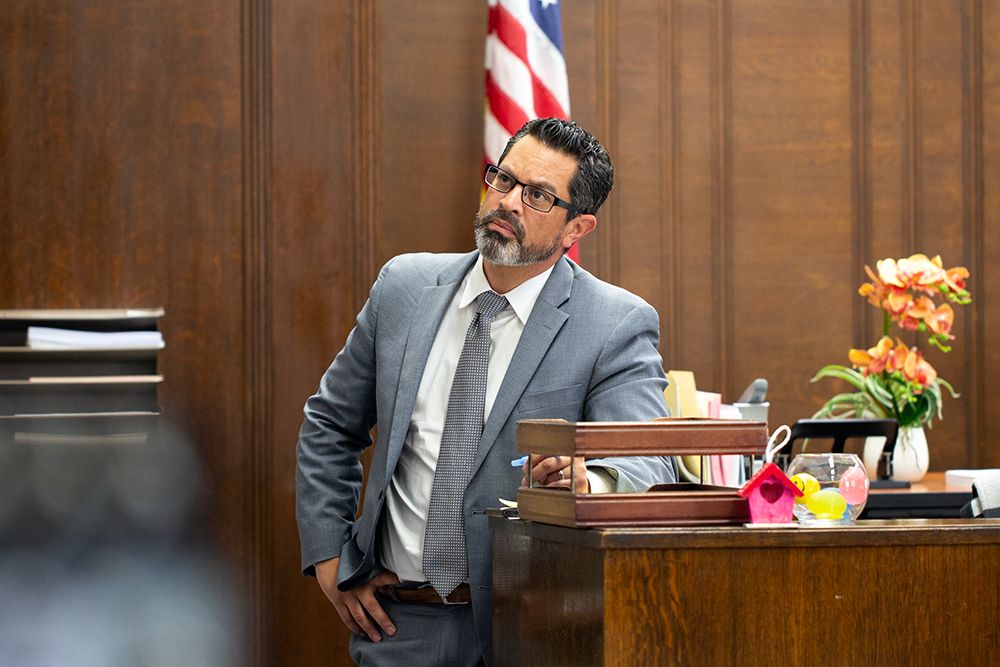
Castillo said public defenders in San Francisco had been talking to the legislature about low-income neighborhoods in their own city when they pushed for changes to state law.
"That’s the reason why this legislation was passed," Castillo said, "to put a dagger in the heart of institutions like the SFPD … and kill their attempts at criminalizing these low-income neighborhoods."
Judge Patton ultimately allowed gang charges and enhancements against all three men to go forward.
But Patton said he had not seen much over the weeks to support a flare-up between Chopper City and Eddy Rock — despite an FBI-SFPD undercover investigation into Eddy Rock that, coincidentally, had been active when Jasper was killed.
"If there was such evidence of a white-hot battle between these two groups," Patton said Wednesday, "I’m certain I would have seen it."
Despite extensive testimony over multiple days and witnesses, Patton observed that the gang evidence presented in the case "was not overwhelming, but it was sufficient for the purpose of holding order."
Jasper Wu case: An ongoing black eye for DA Price
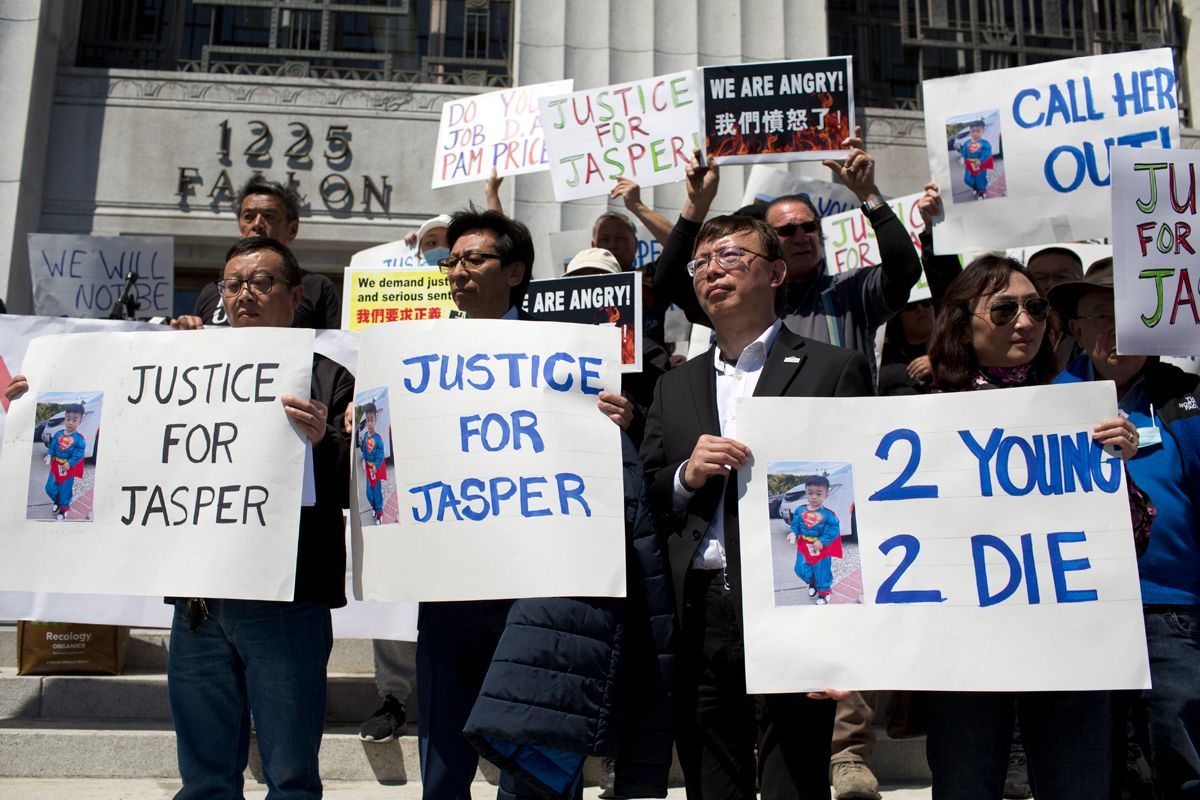
The Jasper Wu case has loomed large in Bay Area headlines for several months, ever since Jasper's parents came out publicly to express their concerns about Price's plans for the case — which may be at odds with the family's wishes.
Jasper's parents have said they want the young men charged with his murder to face the harshest possible penalties, while Price has said her goal in all but the most exceptional cases in Alameda County is to reduce prison sentences, particularly for "youths between 18 and 25."
And racial tensions surrounding the handling of the case, and the DA's office in general, have ratcheted up concerns even higher.
In an early meeting with Jasper's family, Price brought an interpreter who spoke the wrong Chinese dialect, which made for a trying situation amid an already fraught time, said one person who attended the meeting.
In March, ABC7's Dan Noyes uncovered an email Price had addressed "To the Chinese communities," in providing an update about Jasper's case. In the email, Price wrote that she was investigating "non-carceral forms of accountability" — which many interpreted as a sign that she might not seek jail time.
The possibility of plea deals or light sentences in the Jasper Wu case has already prompted outrage from members of the community who organized a rally in April to demand Price's recall.
At the rally, a veteran prosecutor who had been placed on leave described discriminatory remarks toward Pacific Islanders that were allegedly made by a Price leadership team member. The remarks reduced an Asian American prosecutor in the DA's office to tears: She later filed a formal complaint with her union over the matter, ABC7's Dion Lim reported.
In May, a veteran AAPI prosecutor resigned from the Alameda County district attorney's office altogether, saying DA Pamela Price had been "condescending and disrespectful to the AAPI community."
In her resignation letter, she cited the Pacific Islander comments as well as the Jasper Wu case, writing: "We deserve better."
Another resignation from @AlamedaCountyDA, this time from Rebecca Warren, a veteran AAPI prosecutor who says DA Pamela Price has been "condescending and disrespectful to the AAPI community"; cites racist comments by chief asst, concerns re: Jasper Wu case: "We deserve better." pic.twitter.com/efCLKh0LxB
— The Berkeley Scanner (@BerkeleyScanner) May 2, 2023
All eyes on what happens next with Jasper Wu case
Judge Scott Patton's ruling Wednesday marked a major milestone for the case.
But for those who have been watching closely, the biggest question still remains: Will Alameda County DA Pamela Price change her approach to the Jasper Wu case as it now proceeds to trial?
If change comes, it is likely to be within the next two weeks: After the preliminary hearing, the DA's office has 10 court days to file a document that lays out the charges going forward.
This period marks a critical juncture in a criminal case. It's a time when the DA's office looks at what was proven during the preliminary hearing and decides what comes next.
Historically, the new charging document — which is called "the information" — has largely reflected the judge's holding order. Sometimes, new charges are added by the DA's office if additional evidence came to light during the preliminary hearing.
But Price has taken a different approach to the information in at least one other high-profile murder case since taking office — charging less than what the judge upheld during the px.
In January, KTVU reported on Price's decision to drop special circumstances in the David Misch murder case, which took the possibility of life in prison without parole and the death penalty (which is already on hold in California) off the table.
The convicted killer has been charged with murdering two Fremont women and a 9-year-old Hayward girl in the 1980s.
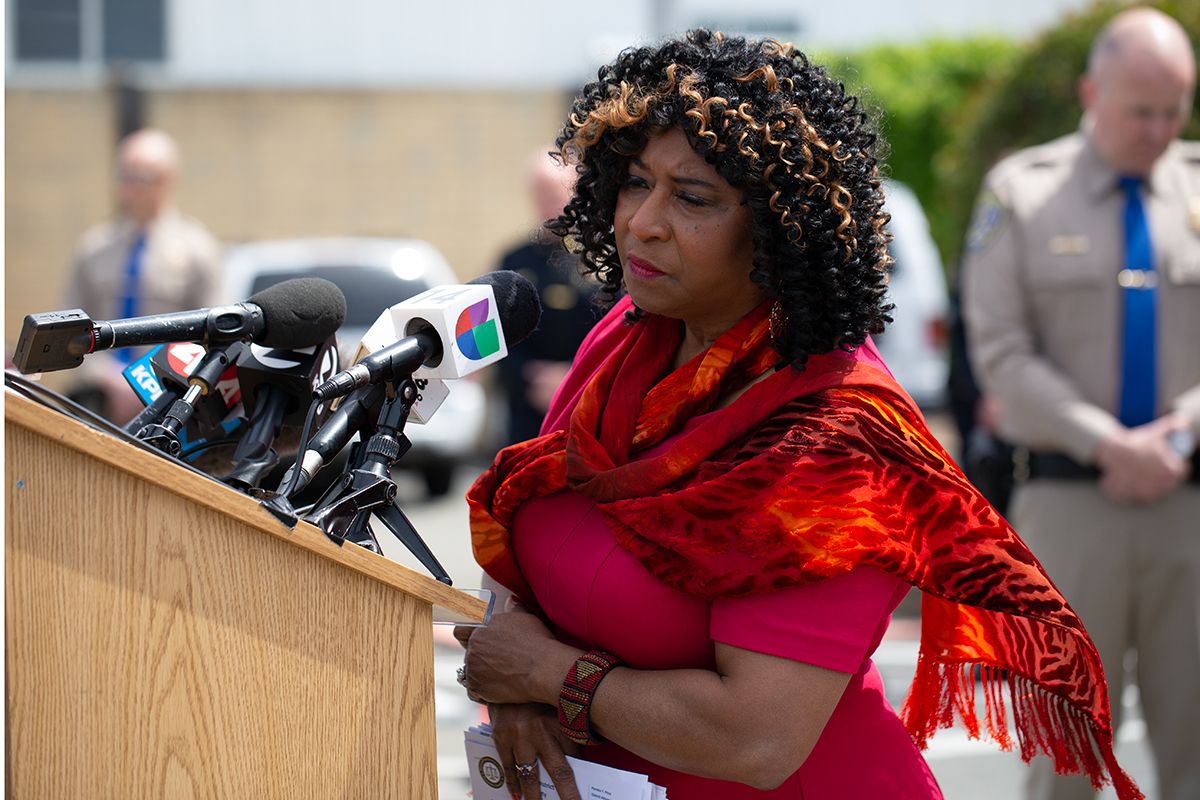
Critics took to the media in January to decry Price's position on Misch, calling it a "total betrayal" for victims' families and saying it undermined the case, KTVU reported.
Sources say it was unprecedented to see something like that in Alameda County.
"No previous administration has ever filed less than what was held to answer," one person familiar with the office said this week. "That just was never done before."
In part that has been a tactical move to help broker better plea deals down the line, prosecutors have said.
It may simply be that Price and her deputies are reviewing major cases that were filed under her predecessor as they organically come up to decide whether to drop special circumstances and enhancements in line with her stated vision.
In a directive she issued in March and finalized last month, Price took the position that sentencing enhancements, which can significantly increase prison terms, are to be avoided in most cases.
Her stated goal in taking that stance, according to the directive, was to "bring balance back to sentencing and reduce recidivism" by shortening prison sentences or replacing them altogether with probation or the minimum term.
Price supporters have also said that long prison sentences are costly and racially discriminatory and that the new DA is fulfilling her campaign promises by working to reduce them.
Will Jasper's case look like Eliyanah's? Time will tell
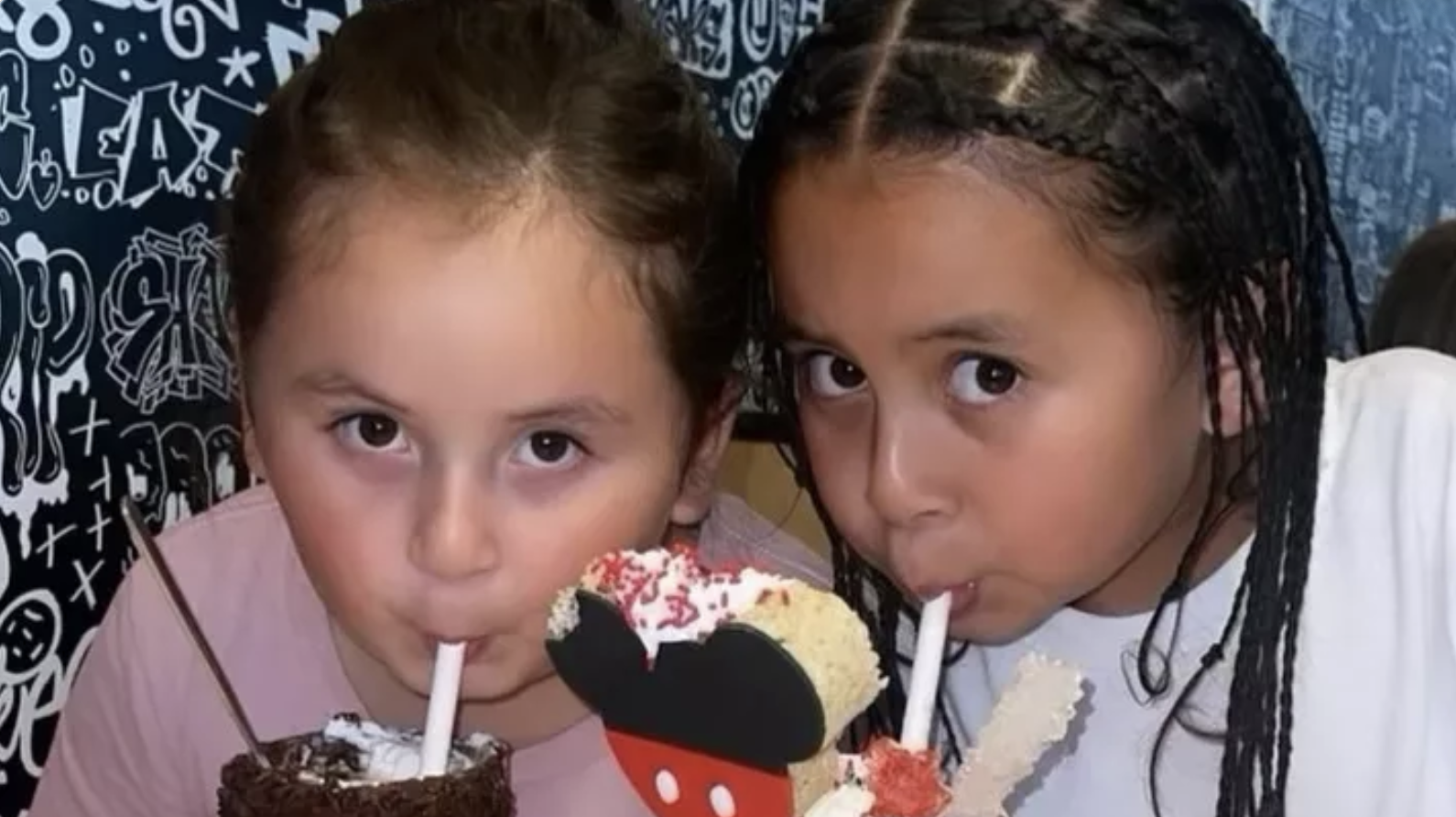
Many people have drawn parallels between the circumstances of the Jasper Wu case and the fatal freeway shooting last month of 5-year-old Eliyanah Crisostomo.
Unlike Jasper's case, filed under Nancy O'Malley, Price's office filed no enhancements or aggravating factors at all in Eliyanah's case.
It was the first time in anyone's recollection that such bare-bones charges had been filed in Alameda County in such a serious case.
As The Berkeley Scanner reported at the time, the break in precedent may have been the most revealing move yet as to how Price plans to overhaul criminal justice in the county — including her approach to the Jasper Wu case.
In a press conference last month, Price said her office was still reviewing Eliyanah's case to decide whether charges would be added.
"We’re not ruling out anything," she said at the time.
But Price also declined to shed light, despite inquiries from the media, as to why gun and gang enhancements had not been filed.
As of this week, according to available records online, there have been no changes or additions to Eliyanah's case since it originally was filed six weeks ago.
As for the Jasper Wu case, Trevor Green, Ivory Bivens and Johnny Jackson Jr. are scheduled to return to court June 8 for arraignment on whatever charges are ultimately filed.




